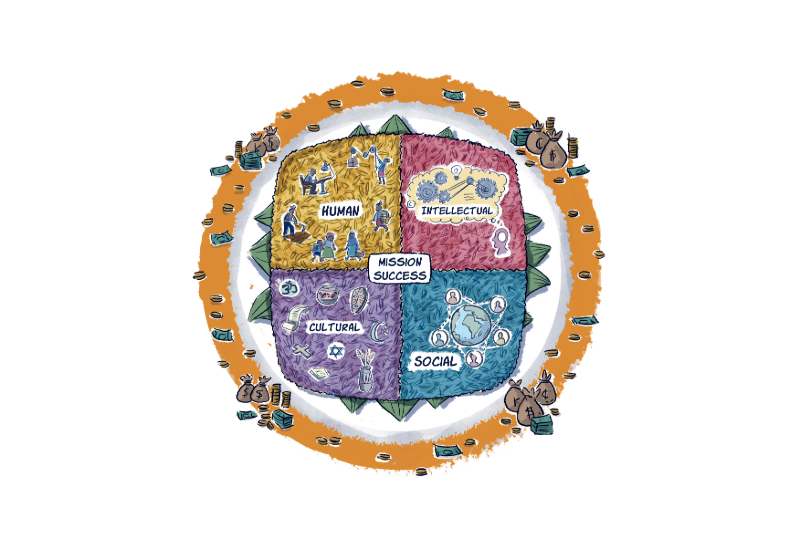How do funding requirements impact programmatic success for local organizations? This article highlights challenges faced by our partners in the Philippines and solutions for elevating nonprofit stories of value.
For both the development and humanitarian sectors, capacity-strengthening activities have historically centered around the needs of external funders and partners. They are designed to address gaps and enable nonprofits and civil society organizations to respond to and comply with imposed requirements. This can include proposal development such as writing and financial reporting, formulating theories of change and logical frameworks, and project monitoring—skills that are required for a local organization to successfully engage with the international aid system but don’t necessarily improve the delivery of their services and impact for communities.
While these skills are important, they might be less relevant when prioritizing strengthening of skills for local needs. A mismatch in capacity support activities can occur when implementing partners (or direct donor partners) assume smaller nonprofits and community organizations have the same capacities as larger INGOs and use those assumptions to measure organizational strength.
In equitable partnerships, due diligence should incorporate existing community practices which are often already in place in various forms within community organizations.
Our partners and recipients of the Abot-Kamay Community Solidarity Fund said financial sustainability and domestic resource mobilization were at the top of their capacity needs. Another identified gap in program delivery was the failure to look at project learnings to support storytelling.
With this in mind, a consortium composed of the Center for Disaster Preparedness (CDP), Nonprofit Finance Fund (NFF), Global Fund for Community Foundation (GFCF), and GlobalGiving designed a values-centric workshop that focused on recognizing and highlighting the importance of community assets and values as drivers of financial sustainability. Dubbed as Kwento (to tell or share a story in tagalog) ng Kwenta (to count or value): The Story of Value, 72 partners gathered for this three-day workshop.
For our partners, these three questions involve essential processes. Attempting to assign monetary value to them is almost sacrilege. They address concrete and valuable community assets that sustain these organizations but are often not included in financial statements, sustainability, or capacity-strengthening plans.
Our partners had previously faced challenges securing full funding from external sources because there can be a lack of awareness among funders about the importance of covering operational costs. Limitations are often imposed to fund specific programmatic activities and neglect essential operational expenses, which ultimately hinder the program’s sustainability and effectiveness.
The workshop provided time, space, resources, and guidance for community partners to engage with and understand new financial management and sustainability approaches. For the purposes of this workshop, the consortium, led by CDP and NFF, created a contextually relevant workbook to support the partners in their journey.
The partners were guided through a strengths framework, budget visioning and planning, and values-based storytelling. The goal was to support community partners to build their technical financial skills and tell the story of their organization’s value. All to support them in advocating better for full cost recovery.
The purpose was to shift the mindset of our partners in how they view themselves, their organizations, and their impact. To do so, the workshop focused on helping them realize the value they offer from four different angles:
 Image credit: Global Fund for Community Foundation (GFCF) and Nonprofit Finance Fund (NFF)
Image credit: Global Fund for Community Foundation (GFCF) and Nonprofit Finance Fund (NFF)
One partner stated:
“Similar to what the Abot-Kamay Community Solidarity Fund (ACSF) is trying to do with making grants accessible to grassroots organizations and building equitable partnerships, the workshop is a breakthrough in terms of anchoring the financial narratives back to values and culture.”
During the workshop, concerns were raised about social justice work at the community level while meeting funder requirements. One specific issue is the conflict between transparency required by funders and security concerns for human rights activists and organizations. For instance, when donors request detailed financial information, like attendance sheets at community events, it can jeopardize the safety of community leaders and members. Grantmaking processes should consider these complexities and create opportunities for open discussions with partners. It’s crucial to recognize and appreciate the valuable insights that community partners provide and ensure that their voices are heard.
Highlighting nonprofit stories of value helps to better inform, educate, and influence donor and partner policies and supports advocating for full cost recovery.
Read more community stories and learnings from the Assets, Agency & Trust Program.
Featured Photo: Train Leaders in Asia for Peace and Sustainability by Sathirakoses Nagapradipa FoundationFind exactly what you're looking for in our Learn Library by searching for specific words or phrases related to the content you need.